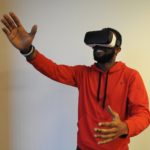Technology, such as electronic health records, and use of tablets can facilitate the communication and recording and sharing of data, between the various partners involved in delivering health and social care.
Is too much screen time bad for our children? Perhaps, but how much do we really know?

David Turgoose explores a systematic review of reviews that looks at the effects of screen time on the health and well-being of children and adolescents. The review found that higher levels of screen time were related to some physical and mental health concerns, such as poor diet, obesity and depression.
[read the full story...]








